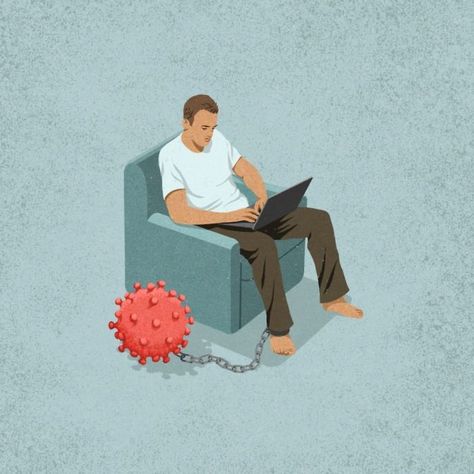It’s among the many ironies of the U.S. that the “American work ethic” is one punctuated by long hours but little actual output (or much of anything to tangibly show for it). That while appearing to “do the most” and actually doing the least, Americans will consistently end up “winning.” This has long been the scenario at hand, but it was mitigated in the mid- and late twentieth century when the U.S. was still a superpower to be reckoned with economically. When it still had all the exports to back up claims of being the “hardest working” country in the world (with the lack of vacation time to prove it—a phenomenon that persists to this day).
In truth, the only thing Americans have ever really worked hard at after their immigrant forebears spawned them in what would subsequently become “their” country is at how to find the easiest possible way out of a situation. This isn’t necessarily condemnation, per se, it’s just how Americans have learned to exist and function on a planet that doesn’t seek to do anyone any favors.
Except, for most other countries faced with this reality, it doesn’t seem to quite invoke the same level of “coping” skills. The latest example of how the U.S. deals with things versus, say, Europe is, naturally, the reaction to coronavirus–struggling first to acknowledge that it could come to roost at all in America and then dealing with what came afterward in terms of how to handle it. Where Europe was swift and resigned (for the most part, save for France and Britain) in shutting down everything and ensuring their denizens were limited in their movements, the U.S. was slow-moving and inconsistent with its “dictums” regarding “lockdown” protocol. And since the U.S. was never actually even remotely locked down to the same extent as Europe, one wonders why Americans feel so “traumatized” over what amounted to the First World problem of a music festival being postponed or their favorite restaurant being closed (though it was likely still open for takeout or delivery). Oh, and not being able to get their hair and nails did.
While Europe remains in lockdown mode even now—and other countries like Brazil and India continue to be stuck in the death throes of the virus—the U.S. is rolling in vaccine supply like Scrooge McDuck in his money pile. Doling it out to their residents as though to prove that the U.S. still does it “bigger and better.” And that the year of 2020 is soon to be nothing more than a distant and nightmarish memory thanks to the U.S.’ “quick fix” mentality. And yes, you can hop us all up on vaccines but it won’t provide the antidote to the sickness that still remains: the American belief that suffering (at all, but especially for “too long”) is for suckers. That putting in time to wait for something to work more effectively or not getting instant gratification is, in short, a “foreigner’s” concept/misfortune.
Of course, the European might happily declare that the U.S. has something right: they’re letting people out of their “pens.” In Europe (save for Scandinavian countries like Finland), the repetitive cycle of lockdown/being let out (limitedly), lockdown/being let out (more freely) ad infinitum is only causing ceaseless tunnel vision where there seems to be no light at the end. Iterating to some Europeans that this is simply “what life is” now. Americans, in contrast, were never made aware of the full extent of just how grim life can be. And despite the nation’s astronomically high case and death count, spurred on by a certain Orange One’s “laissez-faire” (read: “I don’t give a shit”) approach to handling it, the magnitude went largely unfelt by the only class and race in America that still feels it’s the most important (indicated by their perpetually unchanging behavior): the rich and the white.
That America remains, overall, “the richest” country in the world (excluding those Middle Eastern countries still coasting on the boon of their oil barrels) is yet another testament to its blasé reaction overall to a virus that has far more greatly upended the lives of people in other countries. People who have actually put in the work—the suffering—that Americans so often like to claim they do (and that, we’re meant to believe, is why they’re so far “ahead”).
Yet somehow, because of American “gumption” (a.k.a. a dogged and entitled pursuit of absolutely every resource deemed most significant for their “own kind”), these are the people who have “triumphed” over COVID—or rather, secured themselves a more fighting chance against it—despite putting in the least amount of work to combat it (barring, to be sure, the health care workers who will be suffering from PTSD for years). In the end, however, thanks to “God’s” sadistic sense of humor, there’s no “real” protecting against it (especially if you’re a fuckin’ extroverted arsehole), only the chance to further gird one’s immune system.
Thus, it would be rich indeed if all the vaccine conspiracy theorists turned out to be onto something… should all the American bodies pumped full of Pfizer and Moderna (since J&J is ostensibly cancelled) ultimately just shut down altogether (like the robots Elon Musk and Jeff Bezos see us as). You know, the way America never actually did. Meanwhile, much of the rest of the world fights to battle the virus with their own limited (often non-vaccine oriented) methods. Because suffering, it would appear, is just not the American way–and certainly not anything that can be withstood for very long. And that’s how you end up capturing someone crying about losing their diamond earring in the ocean (though definitely not in a plebeian American ocean) on camera.






















